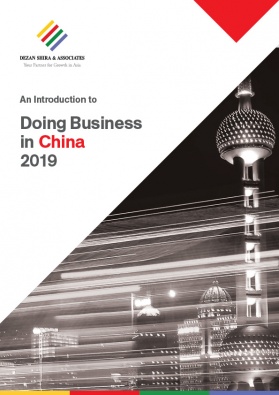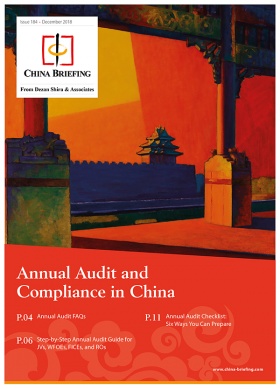China Reinforces IP Laws to Protect Trademarks, Trade Secrets
China is coming down heavily on intellectual property theft in the country with amendments to key laws that will strengthen protections for trademark rights and trade secrets.
China Briefing breaks down the amendments that will lay the groundwork for the forthcoming Foreign Investment Law.
This week, China’s legislature approved amendments to three laws that will strengthen protections for intellectual property (IP) rights in the country.
The Standing Committee of the National People’s Congress (NPC) rolled out the amendments at its bi-monthly meeting from April 20 to April 23.
Revisions were made to the Trademark Law, Law Against Unfair Competition, and Administrative Licensing Law. (See here for the official notification.)
These changes are crucial to the successful implementation of the new Foreign Investment Law that was passed at the end of the Two Sessions meeting in March. The law will come into effect on January 1, 2020.
The need for adequate intellectual property safeguards and their consistent enforcement are key criticisms directed at China by the international community, including the US in its trade negotiations with Beijing.
Here, we highlight how the latest legal amendments will strengthen IP protections for businesses in China.
Crackdown on trademark squatters
Amendments to the Trademark Law come down heavily on trademark squatters and those found guilty of trademark infringement – key grievances repeatedly cited by foreign brands in China.
The revised Trademark Law will come into effect on November 1, 2019.
According to the National People’s Congress Observer blog, the amended law will “penalize those guilty of “bad-faith trademark registrations without intent to use” (Article 4). The Trademark Office will be able to deny such bad-faith applications outright. Further, the onus will be on trademark agencies to refuse clients who file bad-faith applications; accepting such clients will result in a warning or fine (Article 19). Article 44 of the amended law will invalidate all trademarks that have been registered in bad faith.”
The NPC Observer blog also notes the harsher penalties in the amended Trademark Law:
- Quintuple damages for “malicious” trademark infringements and increasing the statutory limit for damages payout to RMB 5 million (US$741,180) from RMB 3 million (US$444,708) (Article 63);
- Directing courts to order the destruction of articles with counterfeit registered marks as well as the tools and materials used to make such articles (Article 63); and
- Authorizing courts to sanction the malicious filing of trademark lawsuits (Article 68).
Strengthening protections for trade secrets
Revisions to the Anti-Unfair Competition Law and the Administrative Licensing Law focus on strengthening protections for trade secrets. Businesses should note that these amendments are already in effect.
Below we highlight the key amendments made to the laws as published on the National People’s Congress Observer blog.
Law Against Unfair Competition amendments
- The definition of trade secrets will include all “trade information”, not just technical information and “business information”.
- Two new types of misappropriation have been added – acquiring trade secrets through “hacking” and “instigating, inducing, or assisting in” the breach of confidentiality to “acquire, disclose, use, or allow others to use” trade secrets (Article 9).
- All entities and individuals – not just “business operators” – are subject to the Law’s prohibitions on the misappropriation of trade secrets (Article 9).
- Provision of quintuple damages for malicious trade secret infringement introduced and the maximum statutory damages increased to RMB 5 million (US$741,180).
- The amendment reverses the burden of proof in civil trade secret suits when the plaintiff makes certain prima facie showings (Article 32).
Administrative Licensing Law amendments
- All those involved in licensing proceedings are prohibited from disclosing an applicant’s “trade secrets, undisclosed information, or confidential business information” without the applicant’s consent or unless otherwise authorized by law (Article 5).
- If an administrative agency is authorized to disclose confidential business information, it must allow the applicant to make an objection.
- No agency is authorized to make the grant of a license conditional on the transfer of the applicant’s technology (Article 31). The agency cannot directly or indirectly demand technology transfer while issuing the license.
China gets serious about intellectual property rights
Earlier this week, China’s Supreme People’s Court announced that the number of IP-related cases heard by courts at all levels across the country had increased significantly in 2018 – and with a high rate of settlement.
The amendments to bolster inadequate IP safeguards and prevent forced technology transfers thus follow the government’s multi-pronged efforts to clean up the country’s image as an open market and an attractive investment destination, where the rule of law is applied transparently and consistently.
Through new incentives, announcements of market openings, and oft-repeated policies, it seems Beijing is trying to emphasize that it is serious – this time round – about making it easier for foreigners to do business in the country and is paying attention to their grievances.
The timing is sensitive. China’s economy is experiencing a slowdown, and many feel the government overplayed its confidence when US President Donald Trump first hiked trade tariffs last year. The tone from the top has since been adjusted. Controversial projects such as Made in China 2025 have also been downplayed.
Strengthening protections for IP rights, being at the center of trade negotiations between Washington and Beijing, is thus as much directed at the US administration as it is to the larger business community. They are also integral to the implementation of the new Foreign Investment Law that comes into force at the start of 2020.
About Us
China Briefing is produced by Dezan Shira & Associates. The firm assists foreign investors throughout Asia from offices across the world, including in Dalian, Beijing, Shanghai, Guangzhou, Shenzhen, and Hong Kong. Readers may write to china@dezshira.com for more support on doing business in China.
- Previous Article Greater Bay Area Subsidies to Boost Overseas Talent Acquisition
- Next Article Marcas registradas en China: cómo proteger su marca en China continental







